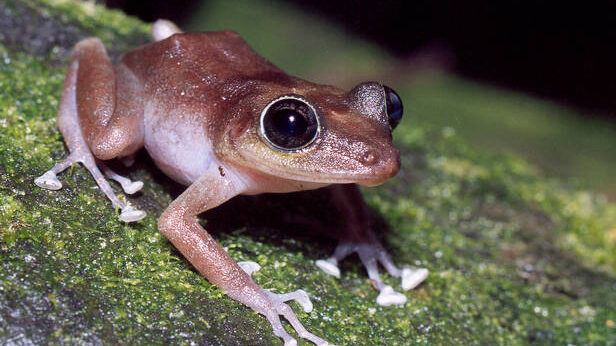Data Releases on Endangered Coqui Frogs Provide Management Insights

Two SE CASC supported data releases, Physiological Analysis of Eleutherodactylus Specimens in West-Central Puerto Rico, 2021-2022 and Post-release survival of translocated Eleutherodactylus coqui in Puerto Rico were published on September 12 by a team led by Jaime Collazo, Assistant Unit Leader of the North Carolina Cooperative Fish and Wildlife Research Unit.
The data releases are a product of the SE CASC project, Strategic Habitat Conservation and Adaptive Strategies for the Conservation of Coqui Frogs in Puerto Rico.
Eleutherodactylus frogs are endemic to Puerto Rico and becoming increasingly imperiled due to global warming and a dried world under climate change. Recent efforts by the Southeast CASC are aimed to inform decision making on when best to pursue managed translocation, or the intentional capture and release of animals to more habitable areas, versus continued management of these populations in their existing locations.
These data analyze the physiological responses of Eleutherodactylus under different temperature treatments and the survival of translocated populations in Puerto Rico. Four temperature treatments (15, 20, 25, 30 degrees celsius) were applied to four representative species of Eleutherodactylus to study temperature effects on their metabolic rates. All species increased their excretion rates of carbon dioxide with increasing temperature. According to future climate projections, species will be exposed to evening temperatures greater than 25°C for an additional 2-3 hours at elevations below 300m and 1 hour at 400-500m. These data suggest that species at lower elevations (<400m) may need to compensate for additional energy usage in the evenings. If this warming trend persists, lower elevation species will begin to infringe on habitats of higher elevation species, such as the E. wightmanae.
Managed translocation could minimize the impact of climate change on coqui frogs by increasing species persistence and supplementing existing populations. To determine the viability of translocation, thirty-four Eleutherodactylus coqui were released to assess post-release survival under two treatments: translocated and not translocated. Twenty individuals were translocated while fourteen were not. Those that were translocated were sent to a different location 0.8km away with similar habitat and environmental conditions. Frogs were observed within the first 17 days post-release, where translocated frogs are expected to have lower survival rates. Translocated individuals were observed traveling a daily average distance significantly more than non-translocated individuals. While managed translocations have the potential to become a useful conservation tool, challenges still remain before it can be considered an integral part of post-translocation monitoring.
Climate change is putting many species at risk. Coqui frogs are forced to adapt to changing conditions resulting from a warmer Earth, such as drier conditions and longer periods of warm evening temperatures. Through this research, more informed decisions can be made to develop adaptation and recovery plans preventing future listings of endangered species.
Learn more about SE CASC projects in our project explorer.
- Categories:
